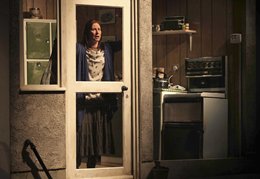Days before her family home is due to be sold, Catherine (Walsh) returns to her Dublin roots. Although some time has passed since her last visit, she immediately spots a new picture on the dining-room wall, and quizzically readjusts a vase. The security alarm shrieks at her entry, alerting neighbour Stephen (Connolly) to her unexpected arrival. Brandishing a bottle of courage through the clamour and confusion, the prodigal daughter seems relieved to be back.
Shafts of light shoot across Anthony Lamble’s realistic street backdrop, as dawn cracks over the suburban neighbourhood. Before the sale is finalised, family members descend on the space for one last time, no one expecting to meet each other - and certainly not Catherine. Liam (Hanly) is keen to sell as quickly as possible, he tells his eldest sister in no uncertain terms, favouring a young, pregnant couple who think it’s perfect for their needs. His daughter Rachel (Nic Liam) is less convinced by the urgency, and tearfully confesses to feeling alienated from her deceased grandparents' lives. As her mother (White) later reminds Catherine, the economic downturn has taken its toll, and her family needs the cash.
On their way to a match, Catherine’s sister Fiona (O’Brien) and love interest Aidan (Lee) also drop by. With no one about, Fiona shows him the house she grew up in, the room she slept in, and marvels at the assured mountains that still frame the sky. So attached is she to the home of her youth, that she had a recent extension removed.
Determined to keep the property, Catherine invites all her family around to discuss options. She plans to buy her siblings' shares, before putting the place up for rent. While the play pitches this congregation as the culmination of the action, no one turns up. Instead, returning home from a short stay with his elderly father, Stephen says goodbye over a bowl of stew, before Catherine abruptly departs herself.
The title of Mercier’s new play, soon to be in repertory with The East Pier, reflects the drama’s preoccupation with the transience of people and places, and a more primal need to settle down. Protagonist Catherine is most representative of this tension. Despite flitting between relationships, locations and careers throughout her life, she is suddenly drawn back to her origins. “I’m feeling very disposable of late,” she hisses at husband Patrick (Bennett), accusing him of not loving her, and failing as a father to their children.
Catherine’s connection to the house is essentially presented as a given. Walsh conveys her character’s singular determination from the outset, digging her heels into the wine carpet as soon as she arrives, and staying put until the closing seconds. However, the writing is less devoted to peeling back the layers of her personal and familial history,  revealing the emotions and circumstances that bring her before us. Why Catherine responds differently to her brothers and sisters is never made clear, for instance, and her over-determined attachment never convincingly explained. Walsh’s performance is both earnest and frazzled throughout, although why we’re not so sure.
revealing the emotions and circumstances that bring her before us. Why Catherine responds differently to her brothers and sisters is never made clear, for instance, and her over-determined attachment never convincingly explained. Walsh’s performance is both earnest and frazzled throughout, although why we’re not so sure.
Less satisfactory still is the way different family members come and go – some opposing the sale, others supporting it – without ever entering into a substantial dialogue with each other. “All I know is memory is everything,” Stephen tells Catherine in the last scene, yet there is a surprising dearth of good ones recalled here. Bright performances by O’Brien and Lee initially suggest that they might offer some necessary counterpoint, but in the writing their roles are untapped. Much like the repeatedly mentioned young couple that Liam wants to sell to, Mercier doesn’t dig deeper where well he might. He circles his core subject with a number of invested characters, yet refuses to stage a great reckoning, or sufficiently explain why not. Catherine leaves suddenly without comment, seemingly abandoning her mission, just so. It’s hard to believe that that this house matters so much to anyone.
The split-level stage, skewed to one side, includes a warren of rooms on the ground, which disassemble into suggestion on the first floor. Under Mercier's direction, some of the most charged scenes take place in the bowels of the corridor, which in being hidden from the audience’s view without obvious purpose, tends to muffle the affect.
In its haunting rumbles, Mel Mercier’s score manages most successfully to modulate feeling, suggesting that there are other stories yet to be told. Set to a billowing curtain and an indigo skyline towards the end, it does its best to convince us of the play’s significance and the poignancy of Catherine’s exit. However, despite the currency of the play’s themes of dislocation and financial struggle, it ultimately feels like the characters are less unanchored than underwritten, and could have much more to say about themselves, and each other.
With everyone gone, the house alarm both sets and flatlines.
Fintan Walsh